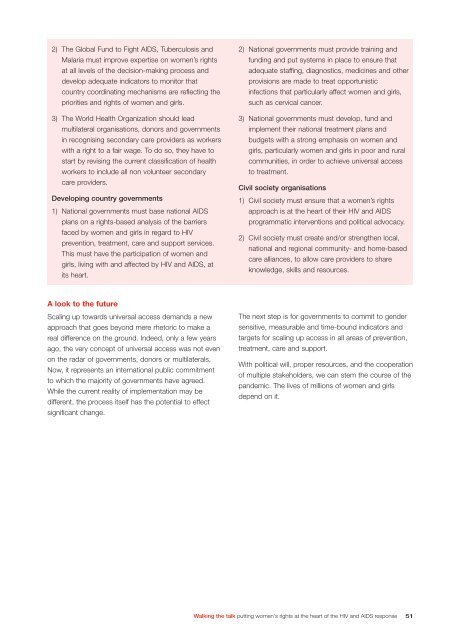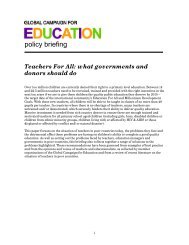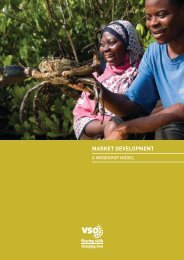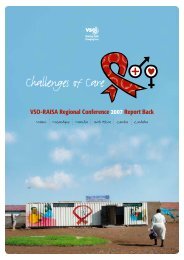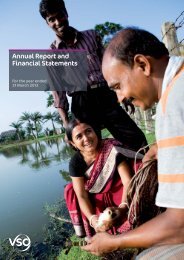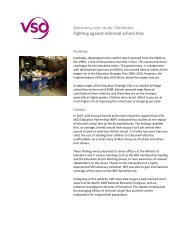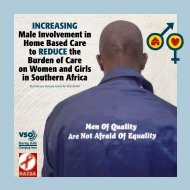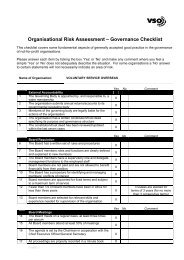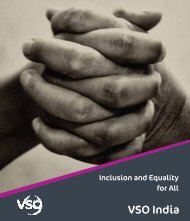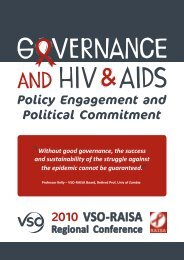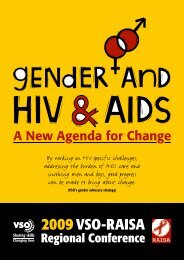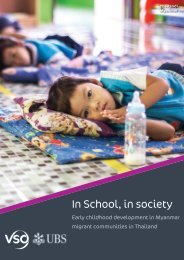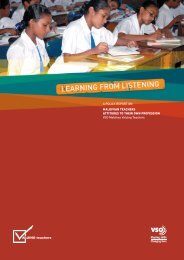Walking the Talk - VSO
Walking the Talk - VSO
Walking the Talk - VSO
You also want an ePaper? Increase the reach of your titles
YUMPU automatically turns print PDFs into web optimized ePapers that Google loves.
2) The Global Fund to Fight AIDS, Tuberculosis andMalaria must improve expertise on women’s rightsat all levels of <strong>the</strong> decision-making process anddevelop adequate indicators to monitor thatcountry coordinating mechanisms are reflecting <strong>the</strong>priorities and rights of women and girls.3) The World Health Organization should leadmultilateral organisations, donors and governmentsin recognising secondary care providers as workerswith a right to a fair wage. To do so, <strong>the</strong>y have tostart by revising <strong>the</strong> current classification of healthworkers to include all non volunteer secondarycare providers.Developing country governments1) National governments must base national AIDSplans on a rights-based analysis of <strong>the</strong> barriersfaced by women and girls in regard to HIVprevention, treatment, care and support services.This must have <strong>the</strong> participation of women andgirls, living with and affected by HIV and AIDS, atits heart.2) National governments must provide training andfunding and put systems in place to ensure thatadequate staffing, diagnostics, medicines and o<strong>the</strong>rprovisions are made to treat opportunisticinfections that particularly affect women and girls,such as cervical cancer.3) National governments must develop, fund andimplement <strong>the</strong>ir national treatment plans andbudgets with a strong emphasis on women andgirls, particularly women and girls in poor and ruralcommunities, in order to achieve universal accessto treatment.Civil society organisations1) Civil society must ensure that a women’s rightsapproach is at <strong>the</strong> heart of <strong>the</strong>ir HIV and AIDSprogrammatic interventions and political advocacy.2) Civil society must create and/or streng<strong>the</strong>n local,national and regional community- and home-basedcare alliances, to allow care providers to shareknowledge, skills and resources.A look to <strong>the</strong> futureScaling up towards universal access demands a newapproach that goes beyond mere rhetoric to make areal difference on <strong>the</strong> ground. Indeed, only a few yearsago, <strong>the</strong> very concept of universal access was not evenon <strong>the</strong> radar of governments, donors or multilaterals.Now, it represents an international public commitmentto which <strong>the</strong> majority of governments have agreed.While <strong>the</strong> current reality of implementation may bedifferent, <strong>the</strong> process itself has <strong>the</strong> potential to effectsignificant change.The next step is for governments to commit to gendersensitive, measurable and time-bound indicators andtargets for scaling up access in all areas of prevention,treatment, care and support.With political will, proper resources, and <strong>the</strong> cooperationof multiple stakeholders, we can stem <strong>the</strong> course of <strong>the</strong>pandemic. The lives of millions of women and girlsdepend on it.<strong>Walking</strong> <strong>the</strong> talk putting women's rights at <strong>the</strong> heart of <strong>the</strong> HIV and AIDS response 51


